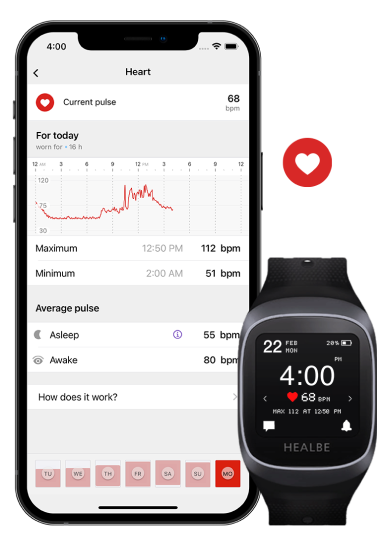
No doubt, The heart is one of the most crucial organs in our body. It pumps blood which provides us with oxygen and nutrients, while also removing metabolic wastes.
Cardiovascular system can be assessed upon two factors:
• Heart rate
• Arterial blood pressure
Since the heart is basically a pump that beats as it moves blood through the circulatory system, one of the major factors that indicates it’s working properly (along with the general well-being of a person) is the heart rate, or the number of heartbeats per minute (bpm).
The normal resting heart rate for an adult ranges from 60 to 100 bpm, with 59 bpm and below indicating bradycardia (a slow heart rate) and 101 bpm and above indicating tachycardia (a fast heart rate). Some people may also experience arrhythmia, or an irregular heartbeat. It is important to know how your heart works, as some of the conditions could indicate a serious health issue.
Arterial blood pressure (BP) is the force of your blood pushing against the walls of your blood vessels. Normal blood pressure at rest for an adult is 120/80 mm Hg.

To make sure your heart functions the best it can over the next several years, you should take the following six steps:
1) Eat healthier. We are talking about a low-fat, high-fiber diet that includes whole grains, some fruit, and lots of vegetables. Nuts like almonds and walnuts and some dried fruits like apricots are great too. Ditch the sugar and saturated fat and lower your salt intake. And remember! Everything’s good in moderation!
2) Drink enough water. A lack of water leads to an increase in blood concentration and its viscosity. This adds stress to the heart and contributes to blood clots, which increase the risk of hypertension, heart attacks, and strokes.
3) Drink less alcohol (yeah, bummer, we know) and quit smoking. Alcohol is very rich in calories. You may, however, allow yourself a glass or two of red wine: it contains catechins and reservatrol (natural substances which improve “good” HDL cholesterol).
4) Get active! Seriously, do some exercise (running, swimming, walking) every day. Doing 30 minutes of activity 5 days a week will significantly lower your risk of heart disease. Fit it in where you can.

Arterial blood pressure (BP) is the force of your blood pushing against the walls of your blood vessels. Normal blood pressure at rest for an adult is 120/80 mm Hg.
To make sure your heart functions the best it can over the next several years, you should take the following six steps:

To make sure your heart functions the best it can over the next several years, you should take the following six steps:
1) Eat healthier. We are talking about a low-fat, high-fiber diet that includes whole grains, some fruit, and lots of vegetables. Nuts like almonds and walnuts and some dried fruits like apricots are great too. Ditch the sugar and saturated fat and lower your salt intake. And remember! Everything’s good in moderation!
2) Drink enough water. A lack of water leads to an increase in blood concentration and its viscosity. This adds stress to the heart and contributes to blood clots, which increase the risk of hypertension, heart attacks, and strokes.
3) Drink less alcohol (yeah, bummer, we know) and quit smoking. Alcohol is very rich in calories. You may, however, allow yourself a glass or two of red wine: it contains catechins and reservatrol (natural substances which improve “good” HDL cholesterol).
4) Get active! Seriously, do some exercise (running, swimming, walking) every day. Doing 30 minutes of activity 5 days a week will significantly lower your risk of heart disease. Fit it in where you can.
5) Manage your weight: Overweight leads to the higher risk of coronary heart disease.
6) Regularly check your heart rate. There is a wide variety of ways—both stationary and mobile, manual and electronic—to do so. The HEALBE GoBe smart band worn on your wrist monitors your heart rate while you are asleep, at rest, or doing some physical activity—no uncomfortable around-the-chest straps required.
7) Regularly check your blood pressure. Both systolic and diastolic blood pressures are not static and undergo natural variations from one heartbeat to another as well as throughout the day. HEALBE GoBe can show your blood pressure at rest, which is measured through the physical activity index and heart rate. All you need is just to press a button to check it out. Please note this function is still being tested.